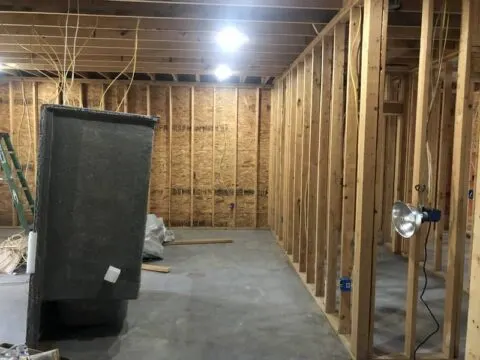I’ve never framed an entire house myself but I have certainly framed my share of garages, walls, and add-ons. I’ve also rehabbed houses and contracted out new homes. So let’s get to it.
Framing a house requires a lot of planning and hard labor, but it can be made easier by doing your research and taking advantage of modern construction technology, like nail guns. If working yourself, having a background in construction makes it a lot easier as well!
In this article, I’ll be talking about what makes framing a house hard, as well as other essential info you should know about framing.
Is Framing a House Hard?
Any type of construction work is hard on the body, but framing a house is also demanding on your mind. Framing requires the ability to read and interpret a blueprint, knowledge of building codes, the ability to safely and properly use tools, and more.
It’s the first step of putting 2D plans into 3D space, and that naturally requires some imagination.
While simply following steps isn’t that difficult, experience with framing homes will help make the whole process smoother and less frustrating. Advances in nail gun technology have made framing easier, but it’s still hard.
Pro Tip: If you are serious about learning the fundamentals of framing, I recommend you read The Complete Visual Guide to Building a House (link to Amazon). This illustrated guide gives an excellent grounding in the fundamentals.
What To Know About Framing a House
Before you try to frame a house, there are things you should be aware of to get the best results out of your work, materials, time, and money.

1. You May Not Be Qualified To Do It Yourself
It’s many people’s dream to build their own homes. There’s just something about having built your home with your own two hands that provides a lifelong sense of satisfaction, but you may not be able to do it by yourself.
Building your own home requires a lot of time management, subcontractor supervision, materials acquisition, and hard labor on your part. Not everyone is cut out for the amount of stress and work, and there’s no shame in hiring a general contractor to do the work for you.
2. You Can Save a Lot of Money Doing It Yourself
If you decide to frame your own house, you can save a lot of money. With judicious research and shrewd bargaining skills, you cut out the cost of labor as well as materials—if bought from the right sources. It’s usually the case that contractors will have wholesale sources of materials you won’t have access to, so you may not save money there.
There’s a natural markup on the experience that contractors have; many have been building homes for decades, which shines through in their expensive pricing models. If you’re confident in your skills and abilities, you can cut a lot of that cost out of the total price of framing your house.
3. You Should Know the Building Code
Whether you’re framing yourself or having a contractor do the light work, you should know building code regulations. Doing it yourself, you need to be able to guarantee the work is done to code and for your own safety. Preferably, you’ll exceed code regulations, but that’s not always possible.
Cheaper and less scrupulous contractors will take shortcuts on some parts of construction to save pennies. Unfortunately, you’re the one who suffers later if something goes wrong because of it. Even if a contractor is doing the framing for you, knowing the building code will help you spot if the contractor is doing the work to code and not cutting corners in order to save money.
4. If Working Yourself, Start Small
If you’re dead set on framing your house yourself, consider doing a smaller framing job first to get a feel for the work. A shed can be a great way to understand the core mechanics of framing walls and even some roof trussing. You’ll spend much less money on materials and far less time on framing than you would on a house.
It’s better to try and build a shed and find that it’s a little beyond your skills—it’d be much worse to try to start building a house and find out it’s not for you!
5. Use Nail Guns
Before pneumatic nail guns became prevalent, framing took a lot of hammering, which is a very physically intensive task, as any construction worker will tell you.
Nail guns take the workout of the task, freeing up time and energy that can be better used for other tasks. Take advantage of technology in order to better frame your house!
If you hire a contractor, you should at least take a look to make sure that they’re using nail guns for the framing process—if not, ask why. The contractor should be making the job as easy and efficient as possible for the workers, and thus cheaper for you as far as labor costs go.
6. Connections Are Key
When you frame a house, the quality of work and the amount of money you spend will depend on connections. A good contractor, for example, should have an extensive list of subcontractors, skilled labor, and wholesale material suppliers on hand. Over time, the contractor has built up a level of trust with these contracts that lets them enlist the help and get materials for much cheaper.
When you do the work yourself, by contrast, you probably don’t have that level of contacts and connections. It helps to have a background in general contracting – in that case, you probably at least know a few people you can call to get materials and labor.
7. Ensure Permits Are in Order
Building permits are vital when undertaking any construction project, from remodeling to building a mansion. Whether you’re framing yourself or letting a contractor take care of it, you have a responsibility to check that all necessary permits are taken care of.
If framing yourself, you’ll have to research what permits you need to apply for before starting construction. This usually involves a wait at the county office, paperwork, and a fee.
Contractors typically take care of permits when they’re hired, but it’s in your best interest to make sure they do it correctly. If they don’t file the correct permits, you are liable for anything that goes wrong. Conversely, having permits filed makes it in the contractor’s best interest to perform the highest quality work.
Final Thoughts
Framing a house is a tough job, whether you do it yourself or hire a contractor. Either way, you should be aware of regulations and at least passingly aware of the vital aspects of the process. That way, you can guarantee the work is built to last.
Recommended Reading:
- How Long Should a Concrete Slab Cure Before Framing?
- Is it Cheaper to Build up or Out? Construction Framing Costs
- Can You Frame a Basement With Metal Studs?
As a homeowner, I am constantly experimenting with making the structure of my house more energy-efficient, eliminating pests, and taking on DIY home improvement projects. Over the past two decades, my family has rehabbed houses and contracted new home builds and I’ve learned a lot along the way. I share my hard-learned lessons so that you can save time and money by not repeating my mistakes.

